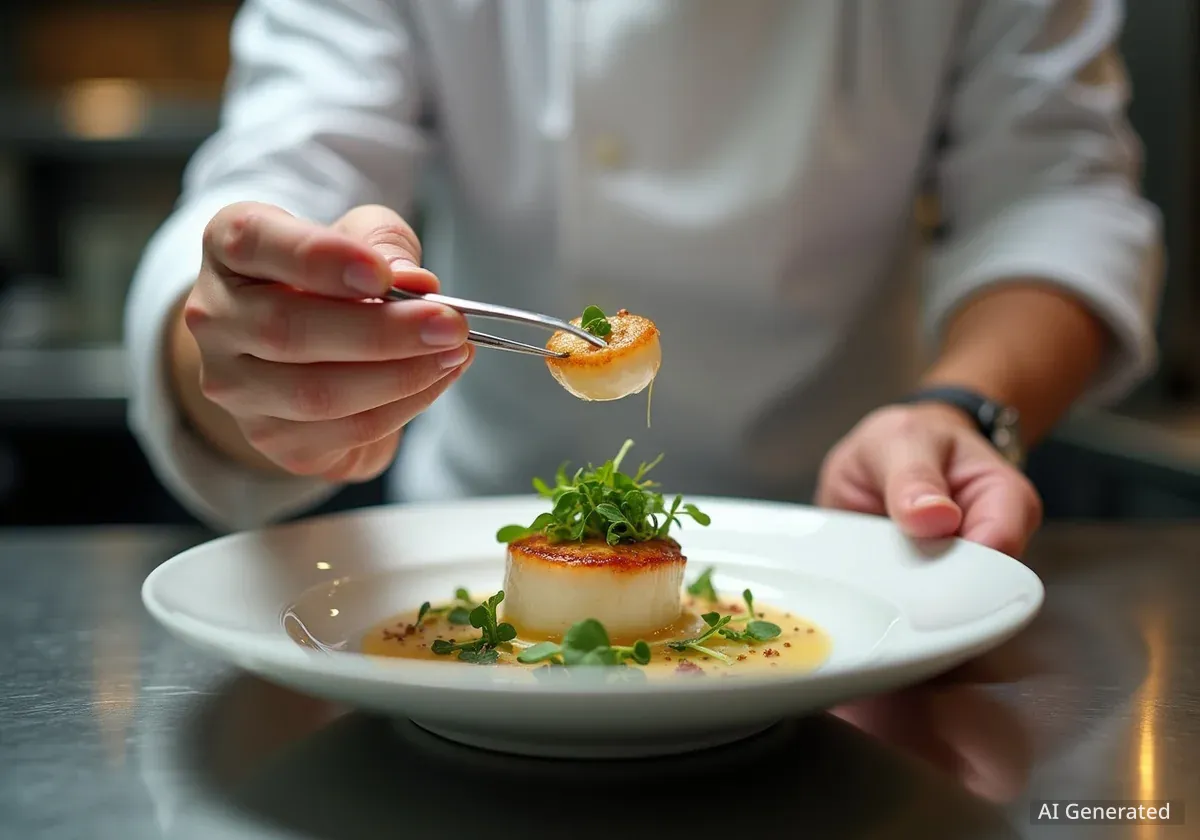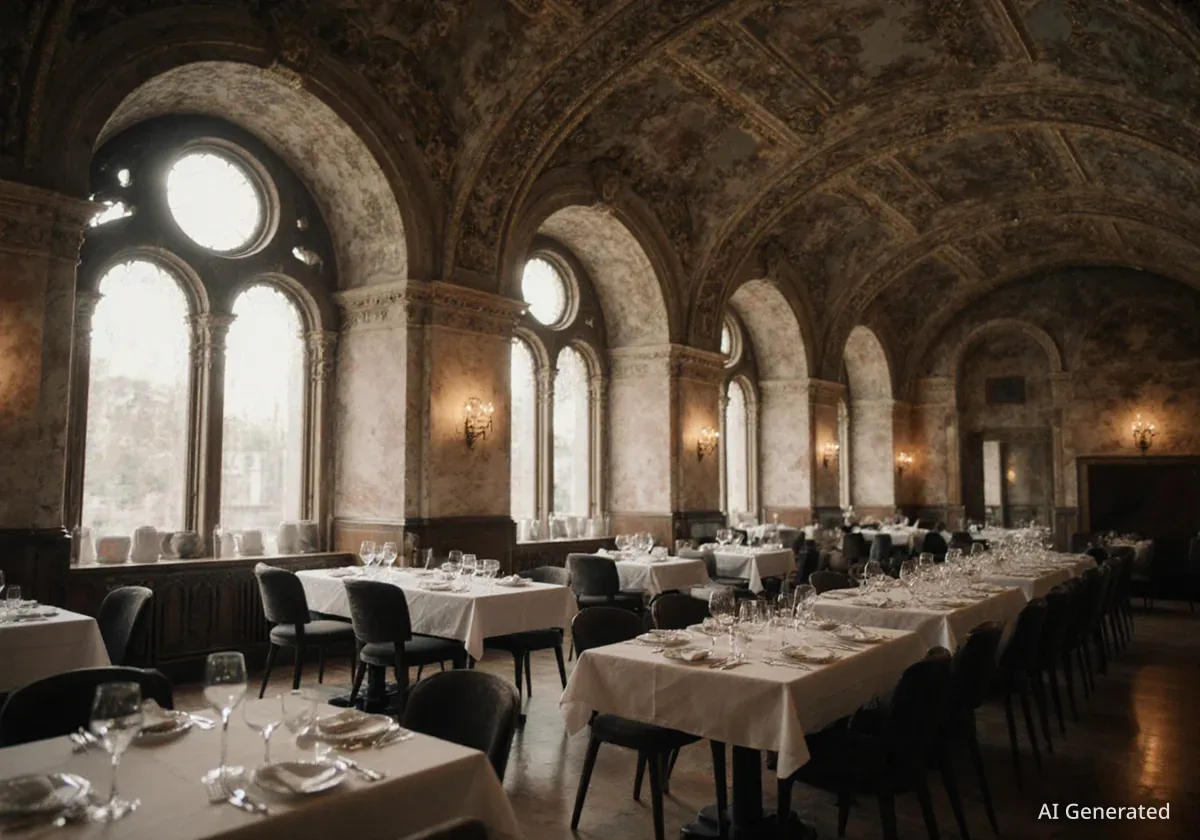Three prominent chefs from Switzerland's Canton of Bern are openly discussing the impact of Gault Millau ratings on their businesses. While these prestigious points are valuable for marketing, they also bring unique challenges. Restaurateurs explain how they balance culinary ambition with guest expectations and financial realities in the competitive world of high-end gastronomy.
Key Takeaways
- Gault Millau points are a strong marketing tool for Swiss restaurants.
- Maintaining high ratings requires constant perfection and can lead to operational challenges.
- Guest expectations for service and ambiance increase with higher point ratings.
- Restaurants are adapting to changing customer behavior, including reduced wine consumption.
- Passion and dedication are essential for success in fine dining, alongside financial backing.
Gault Millau Ratings: A Marketing Advantage
On a recent Monday, just after noon, chefs across Switzerland were refreshing their phone screens. They were awaiting the new Gault Millau results for October 6, 2025. This annual event is a critical moment for the nation's fine dining establishments.
Lukas Kiener, head chef at Restaurant Zur Gedult in Burgdorf, was among them. His team celebrated when their 17-point rating was confirmed. Barbara Schütz, the restaurant's managing director, admitted that losing even one point would have been a significant disappointment.
Gault Millau Switzerland
- Awards 12 to 20 points to restaurants annually.
- No restaurant in Switzerland has ever reached 20 points.
- Only 8 establishments currently hold 19 points.
- Canton of Bern has only one 18-point restaurant and seven at 17 points.
These ratings from Gault Millau, overseen by Ringier-Verlag in Switzerland, serve as a powerful marketing tool. They signal culinary excellence to both local diners and international visitors. The recognition helps restaurants stand out in a crowded market.
The Pressure of Maintaining Excellence
Gastronomes do not know when anonymous critics will visit for a test meal. However, seasonal menu changes often allow chefs to estimate the approximate timing of the review based on the published critiques. This adds an element of constant readiness to their work.
"It would have been a disappointment for us if we had lost a point," said Barbara Schütz, Managing Director of Restaurant Zur Gedult.
Barbara Schütz felt a critic might have visited when she noticed a diner writing in a notebook. This feeling was later confirmed. Despite this, she emphasized that all guests receive the same high level of service. This commitment to consistency is a hallmark of top-tier dining.
Lukas Kiener's kitchen at Zur Gedult is known for its creative combinations and perfect execution. Schütz highlights Kiener's constant perfectionism. His kitchen operates with minimal staff. "If Lukas is absent, we close the restaurant for the day," Schütz explained. This shows the critical role of the head chef in such operations.
Distinction in Fine Dining
While Gault Millau points are important, a Michelin star often carries more weight in the global culinary scene. Chef Lukas Kiener even has a Michelin star tattooed on his forearm, showing its significance to him. These accolades drive both prestige and customer traffic.
When Zur Gedult first achieved 17 points in the 2023 Gault Millau guide, the team celebrated. Schütz noted that both Gault Millau and Guide Michelin ratings significantly impact everyone in fine dining. These guides create a benchmark for quality and innovation.
Balancing Ambition and Guest Expectations
At Zur Gedult, a six-course meal costs 170 Swiss Francs. The restaurant serves up to 22 guests per evening. About 20% of their customers come from the Burgdorf region. The remaining 80% travel from Bern or further away. Schütz states that the points are crucial for their business. "For us, the points are important. It is extremely good marketing."
Christoph Hunziker, owner of Schüpberg-Beizli, also understands the value of culinary recognition. His restaurant gained a point, now holding 15 Gault Millau points. Hunziker's forearm also features tattoos, including the Michelin Bib Gourmand symbol, which recognizes good quality, good value restaurants.
Evolution of Schüpberg-Beizli
Hunziker took over the rustic inn eleven years ago. He credits his early success to public curiosity. "I was lucky that people wanted to know what Hunziker was doing on the Schüpberg," he said. His cooking skills, communication abilities, and business acumen helped him build a loyal customer base.
Hunziker also emphasizes the importance of listening to guests. "It does not help if I realize myself, and the guests stay away," he explained. He transitioned the restaurant from a fondue-focused eatery to a gourmet destination gradually. He disliked fondue but waited four years before phasing it out. This strategic patience allowed guests to adapt to the new culinary direction.
The elimination of fondue was recognized by Michelin and Gault Millau. However, fine dining also means higher prices. Hunziker observed that 15 points still allowed him to keep prices accessible. However, some colleagues found it difficult to maintain profitability beyond 17 points. This is because guests then expect more luxurious amenities, such as more comfortable chairs and finer wine glasses.
Changing Beverage Consumption Trends
At Schüpberg-Beizli, a seven-course menu costs 134.50 Swiss Francs. Six à la carte main courses range from 40 to 65 Swiss Francs. "My dishes cost what they cost. And I do not like to justify my prices," Hunziker stated. This reflects a commitment to ingredient quality and culinary integrity.
Historically, lower menu prices could be offset by high wine sales. However, many establishments now struggle as wine consumption declines. Some restaurants increase beverage prices to counteract this trend. Hunziker, however, chooses a different approach.
"It doesn't help if I realize myself, and the guests stay away," Christoph Hunziker on adapting to customer preferences.
"Some places charge 14 francs for a liter of water, but their fillet is 10 francs cheaper than mine," he noted. "I do not want to cross-subsidize. But it would be sugar-coating if it wasn't partly like that for me too." Beverages account for just over one-third of Schüpberg-Beizli's turnover.
Despite its remote location, Schüpberg-Beizli maintains stable wine sales. Younger generations may drink less, but for older rural residents, wine remains a part of the meal. Hunziker believes a 0.5-per-mille alcohol limit does not change this. "I am not a policeman, and it is not my place to decide if someone can still get behind the wheel," he said.
New Entry in Bern's Fine Dining Scene
Hallers Brass, run by Stefan Zingg and Sabine Nussbaumer, is a new entry in the Gault Millau guide with 13 points. This restaurant is located in Bern's Länggasse district, just nine kilometers from Schüpberg-Beizli. They have operated the neighborhood restaurant for five years, initially for the Steinhölzli Foundation, and now under their own company.
"It is a very good start and gives us visibility because we are a bit hidden in the neighborhood," said Sabine Nussbaumer. Stefan Zingg added, "We will not adjust our concept now just to get to 14 or 15 points." This indicates a focus on their established culinary identity.
Hallers Brass Offerings
- Seats approximately 45 guests.
- Four-course vegetarian menu: 84 Swiss Francs.
- Meat menu: 92 Swiss Francs.
- Small price difference due to labor-intensive vegetarian dishes and high staff costs.
Zingg explained the small price difference between vegetarian and meat menus. "Vegetarian dishes are very labor-intensive for us, and staff is simply the biggest cost driver." They also pay fair prices to their suppliers, who are listed by name on the menu, ensuring high-quality products.
For beverages, Hallers Brass offers homemade iced teas and lemonades at lunchtime. They also have a large selection of wines by the glass, including premium varieties costing up to 15 Swiss Francs per deciliter. "Guests appreciate being able to enjoy just one glass of a nice Burgundy from the barrel," Zingg noted. Popular items also include 3.75-deciliter bottles.
Sabine Nussbaumer focuses on a wider selection of open wines to address reduced wine consumption. Zingg and Nussbaumer own the public limited company that leases the restaurant. In contrast, Christoph Hunziker owns the Schüpberg-Beizli property. Zur Gedult is operated by a cooperative chaired by Barbara Schütz.
Running a high-end restaurant requires significant investment. "Without people who invest money, it is not possible," Schütz stated. Lukas Kiener concluded, "The amount of work and all the time you put in cannot be financially compensated. You need joy and passion." This highlights the dedication required for success in fine dining.




